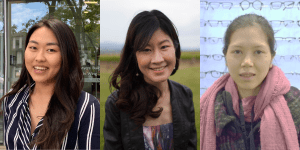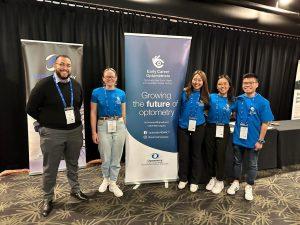1:30min

–
Judy Nam, Jia Jia Lek and Lily Ho have each been awarded a travel scholarship as part of Optometry Australia’s 2024 Looking Outward on Optometric Knowledge (LOOK) International program.
Launched in 2020, the LOOK International program was established to evolve optometric scope of practice by funding member-led study tours that investigate international optometric advancements that are not yet available, or readily available, in Australia.
Optometry Australia’s Director of Optometry Advancement, Sarah Davies said, ‘We were thrilled by the high level of interest we received from members across the country for this program and thank everyone who applied.
‘We were truly impressed by the high calibre of applications we received. After a thorough external review, we have once again decided to offer an additional third scholarship in 2024.
‘Congratulations to Judy, Jia Jia and Lily, who will each receive $8,000 in support of their planned study tour in 2024. We are proud to be able to support their investigations, and excited to share their findings and experiences with our wider membership in the coming year.’
Judy Nam – Telehealth in the UK

Judy graduated with a Bachelor of Vision Science and Master of Clinical Optometry from UNSW, and is currently working at the Centre for Eye Health (CFEH). She is Chair of the Early Career Optometrist NSW/ACT Committee, which allows her to advocate and engage with younger optometrists.
With her study grant, Judy plans to travel to the United Kingdom to evaluate the successful integration of digital health technologies in public eye care systems.
‘The widespread integration of telehealth into optometric practices reduces geographical barriers to care for patients and allows community optometrists to work more collaboratively with ophthalmology to provide best coordinated practice care,’ she said.
‘I plan to evaluate barriers and enablers to the success of telehealth in various regions of the UK, understanding the role of both optometry and AI within these systems and exploring how these digital health initiatives have been successfully and sustainably funded.’
Through her learnings, she is hoping to add a new perspective to the publicly available information relating to telehealth, AI and optometry in Australia.
‘My aim is to develop some practical recommendations on how telehealth and AI may be best incorporated into the existing optometry framework of Australia. It’s my hope that this might be used as part of a larger optometry-led advocacy piece to support Australia-wide reform of the public health system that prioritises reduced wait times and overcoming geographical barriers to care.’
Jia Jia Lek – Myopia prevention programs in Singapore
As an academic and optometrist, Jia Jia has advocated for positive change at local and international levels in various roles throughout her career. She is currently a lecturer in the Department of Optometry and Vision Sciences at the University of Melbourne.
Through the LOOK scholarship, Jia Jia aims to address the pressing issue of myopia in Australia by drawing inspiration from the successful National Myopia Prevention Program (NMPP) in Singapore.
‘Myopia is a growing concern in Australia. It has significant public health implications, affecting both quality of life and healthcare costs. Slowing down and reducing the risk of myopia development require the concerted effort of all relevant stakeholders. Singapore has made substantial progress in myopia prevention through coordinated efforts among diverse stakeholders,’ she said.
‘I plan to investigate the dynamics of collaboration between stakeholders in Singapore and identify the challenges and best practices in Singapore, the only country that has implemented a successful nation-wide myopia prevention program. This will involve examining Singapore’s NMPP, which engages multiple stakeholders, including educational institutions, healthcare organisations and professional groups. Key elements to be explored include public educational strategies, school-based vision screening and parental awareness.
‘With these learnings, I hope to provide a roadmap for implementing effective myopia prevention programs in Australia.’
Lily Ho – Surgical and laser training in the USA
A Senior Lecturer and Principal Staff Optometrist at UNSW, Lily supervises students in clinics and teaches in areas of ocular therapeutics and contact lenses at both undergraduate and postgraduate levels.
With her study grant, she plans to travel to the United States to explore the evolution of optometry practices, which is characterised by state-specific regulations leading to various scopes of practice. While some states in the US permit optometrists to perform surgical procedures and laser treatments, others have more restricted regulations.
‘In comparison to countries in North America, Australian optometrists are underutilised in the healthcare system. Oral medications and surgical procedures are outside our scope of practice,’ Lily said.
‘I wish to explore the potential for Australian optometrists to further expand our scope of practice with surgical procedures such as minor surgery and laser treatment. Upskilling optometrists and increasing our scope of practice will be the safest, most practical and cost-effective way to improve patient access to quality and timely eye care.’
In the US, Lily plans to visit the Northeastern State University College of Optometry (NSUOCO) in Oklahoma, where they conduct a course on surgical and laser training. Following the course, she aims to observe NSUOCO clinics, including speciality clinics, and opportunities to see optometrists collaborating with ophthalmologists.
‘Given the shortage of ophthalmology service and our ageing population in Australia, ophthalmologists are conceivably best utilised in complex, high-level surgical care.
‘Improving and better utilising our optometry workforce will help to reduce patient wait time for public ophthalmology, minimise duplication of care and thus minimise costs to both the patients and our healthcare system.’
Tagged as: Awards - honours - grants-bursaries, members